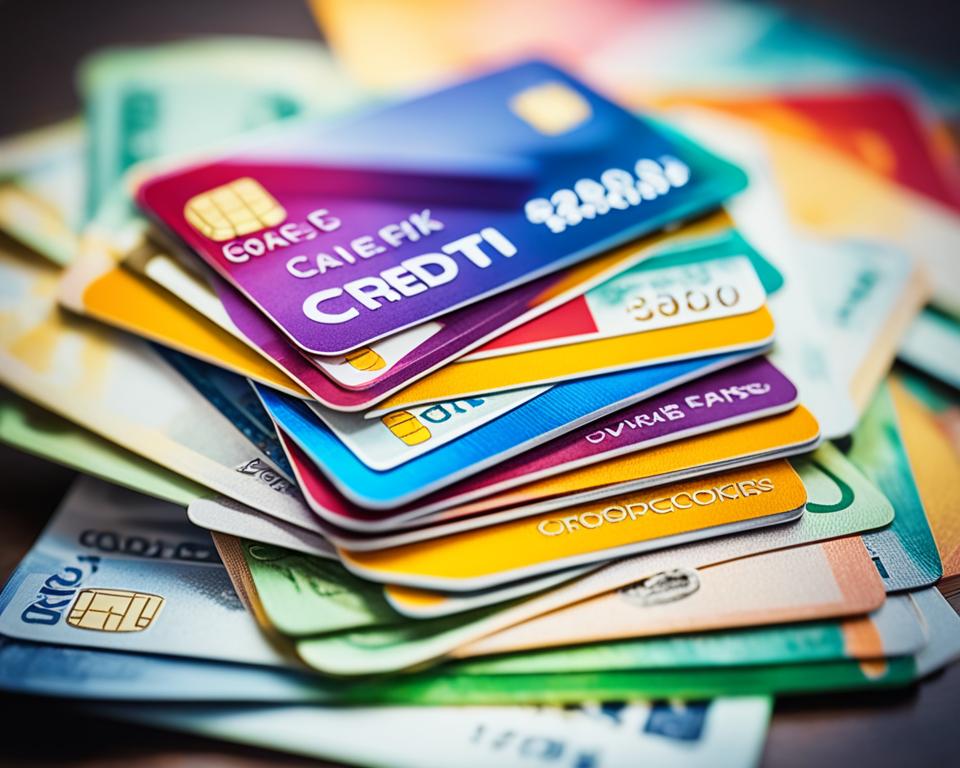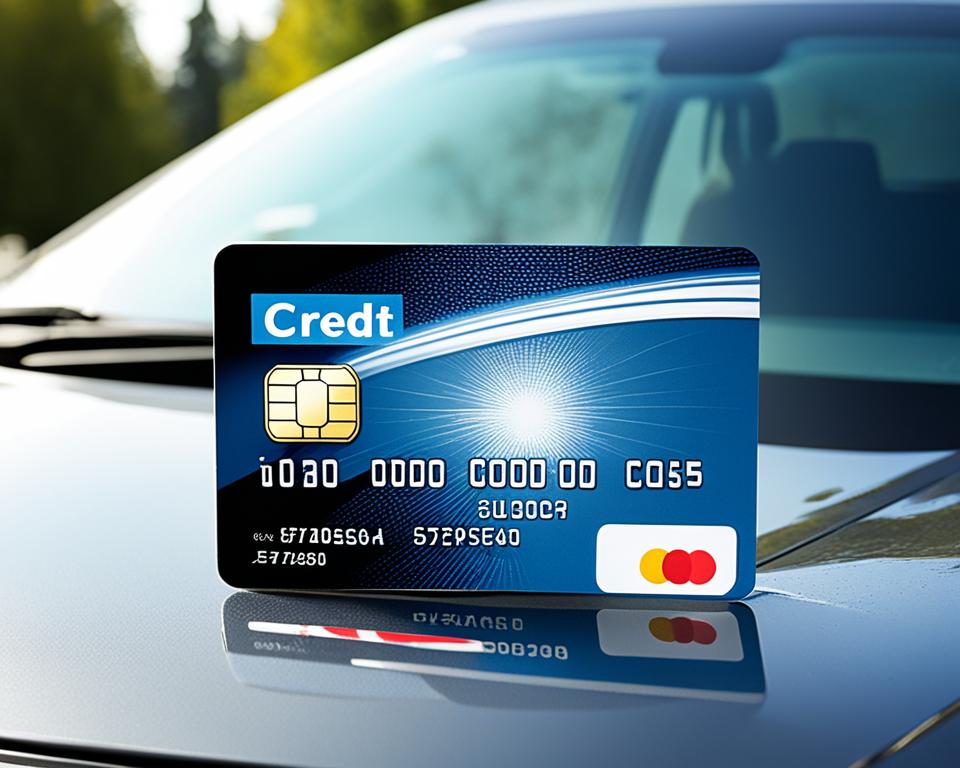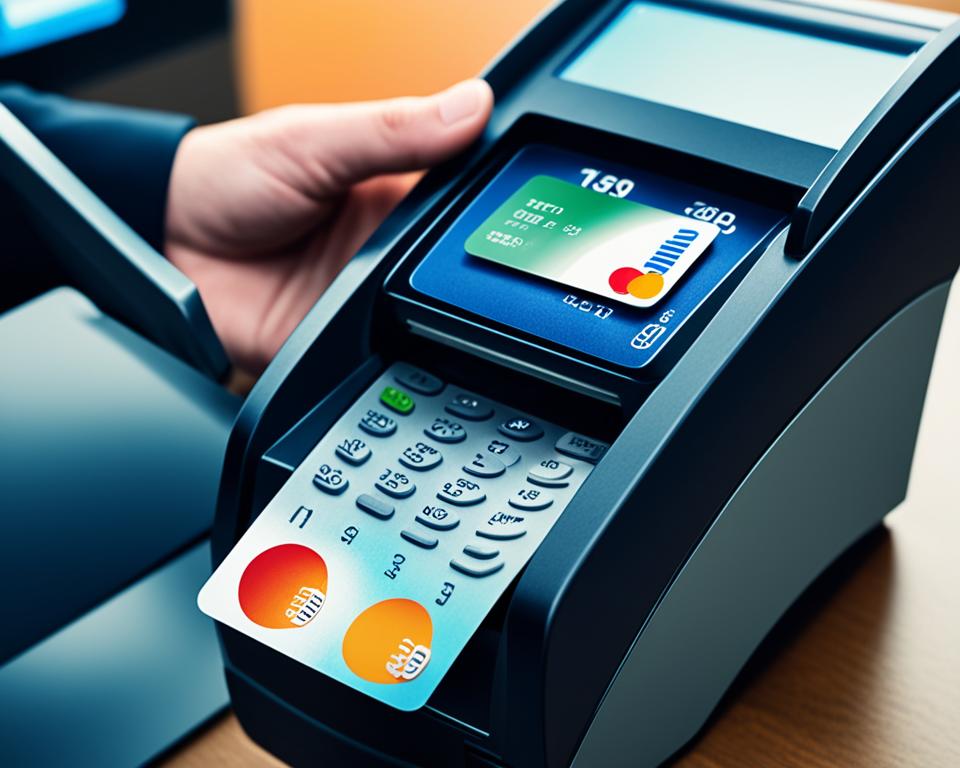Credit cards have become a ubiquitous tool in managing finances and making purchases. While some people may associate credit cards with debt and financial troubles, when used responsibly, they offer numerous benefits and advantages that can enhance your financial life. In this article, we will explore why credit cards are good and delve into the top benefits they provide.
Key Takeaways:
- Using credit cards responsibly can help individuals build credit history and improve credit scores.
- Credit cards offer cash back rewards, allowing cardholders to earn a percentage of their spending as cash back.
- Rewards points earned through credit card usage can be redeemed for various rewards, such as travel, gift cards, and merchandise.
- Airline credit cards provide the opportunity to earn frequent-flyer miles, which can be used for booking flights and enjoying additional benefits.
- Credit cards offer safety through fraud protection and zero liability coverage for unauthorized purchases.
Building Credit with Credit Cards
Using a credit card responsibly can have a positive impact on an individual’s credit history. Credit card companies report payment activity to credit bureaus, which helps establish and improve credit scores. This, in turn, opens up better interest rates and loan opportunities in the future.
Credit card usage is reflected in credit reports, showcasing a person’s ability to manage credit responsibly. On the other hand, debit card use does not contribute to credit history since it is tied directly to available funds.
How Credit Card Usage Builds Credit
Every time a credit cardholder makes a payment on time, it demonstrates their reliability to potential lenders. These payment activities are reported to credit bureaus TransUnion, Experian, and Equifax, who compile credit reports and calculate credit scores. Timely payments and a low credit utilization ratio contribute positively to credit scores, showing responsible credit management.
For example, Jake, a young professional, uses his credit card to pay for groceries, gas, and other monthly expenses. He always pays the full balance on time, reflecting a good credit utilization rate and consistent payment behavior. Over time, his responsible use of credit cards helps him establish a solid credit history, proving to lenders that he is a reliable borrower.
A positive credit history can lead to various benefits, such as:
- Qualifying for lower interest rates on loans and credit cards
- Gaining approval for higher credit limits
- Having more negotiating power on favorable credit terms
Image: Credit Card Building Blocks
Understanding Credit Reports
Credit reports provide a comprehensive overview of an individual’s credit history. They contain information like a person’s credit accounts, payment history, outstanding balances, and credit inquiries. The consistent use of credit cards and responsible payment behavior are key factors in building a positive credit history.
Mary, another credit cardholder, checks her credit report regularly to monitor her credit standing. She notices that her credit card payments are consistently reported and reflected in her credit report, confirming her responsible credit card usage.
| Credit Card Activity | Credit Report Entry |
|---|---|
| Timely credit card payments | Payment history: On-time payments |
| Low credit utilization | Credit utilization ratio: Low |
This table illustrates how credit card activity is translated into credit report entries that showcase responsible credit management.
“Using a credit card responsibly is like building a solid foundation for your financial future. It helps establish trust with lenders and opens doors to better financial opportunities.”
– Financial Advisor
Cash Back Rewards
One of the major perks of using credit cards is the opportunity to earn cash back rewards on purchases. Many credit card issuers offer lucrative cash back programs that allow cardholders to earn a certain percentage of their spending as cash back. These rewards can add up quickly, giving consumers the chance to save money or reinvest it into their financial goals.
How Cash Back Rewards Work
When using a credit card that offers cash back rewards, cardholders can typically earn a percentage of their spending as cash back. The amount of cash back earned varies depending on the card and the spending category. On average, cash back percentages range from 1% to 6%.
Some credit cards also offer higher cash back rates for specific categories, such as groceries or dining. For example, a card may offer 3% cash back on grocery purchases and 2% cash back on dining expenses. This allows consumers to maximize their cash back earnings by utilizing their credit card for everyday expenses.
To redeem cash back rewards, cardholders have a few options. One common method is to use the cash back as a statement credit, which reduces the overall balance owed on the credit card. Another option is to have the cash back deposited into a bank account, providing additional flexibility and control over the funds.
It’s important to note that cash back rewards can expire if not used within a certain timeframe or if the credit card account is closed. Therefore, it’s essential to review the terms and conditions of the specific credit card program to ensure that cash back rewards are utilized effectively.

| Credit Card | Cash Back Percentage | Spending Categories |
|---|---|---|
| ABC Bank Cash Back Card | 1% | All purchases |
| XYZ Credit Union | 2% | Groceries, gas |
| Best Rewards Card | 3% | Travel, dining |
As demonstrated by the table above, different credit cards offer varying cash back percentages and rewards categories. By choosing a credit card that aligns with their spending habits, consumers can maximize their cash back earnings and enjoy greater financial benefits.
Rewards Points
Credit cards offer an enticing opportunity to earn rewards points while making everyday purchases. These points can be redeemed for a variety of rewards, including travel experiences, gift cards, and merchandise.
One of the key advantages of credit card rewards points is their versatility. Cardholders have the flexibility to choose how they want to use their earned points based on their personal preferences. This allows individuals to maximize the value of their rewards by selecting options that align with their specific needs and desires.
Many credit card issuers offer co-branded cards that provide enhanced rewards when used with specific retailers or organizations. These partnerships allow cardholders to earn points at an accelerated rate, making it easier to accumulate a substantial amount of rewards quickly.
When redeeming rewards points, it’s important to be familiar with the redemption options available. Popular choices include:
- Travel: Convert rewards points into airline miles or hotel loyalty program points to enjoy discounted or even free travel.
- Gift Cards: Use rewards points to obtain gift cards for popular retailers, allowing for convenient shopping or gifting.
- Merchandise: Redeem points for a wide range of products, including electronics, home goods, and fashion items.
Cardholders should review their credit card’s rewards program carefully to understand the redemption process and any associated restrictions or limitations. Some credit card rewards programs may have specific blackout dates or minimum point requirements for certain redemptions.
It’s important to choose a credit card that aligns with your spending patterns and rewards goals. By selecting a card that offers bonus points on the types of purchases you frequently make, you can accelerate your rewards earning potential.
Keep in mind that rewards points often have an expiration date, so it’s crucial to monitor your points balance regularly and plan your redemptions accordingly. Additionally, responsible credit card use, such as making timely payments and avoiding carrying high balances, can help ensure that you continue to earn and maximize rewards points.
Comparison of Major Credit Card Rewards Programs
| Credit Card | Rewards Program | Main Benefits |
|---|---|---|
| Chase Sapphire Preferred | Chase Ultimate Rewards | Earn bonus points on dining and travel, flexible redemption options |
| American Express Platinum Card | Membership Rewards | Access to exclusive travel perks and partners, generous point transfer program |
| Citi Double Cash Card | Citi ThankYou Rewards | Double cash back on all purchases, extensive range of redemption options |
Table: A comparison of major credit card rewards programs
Ultimately, credit card rewards points provide a valuable opportunity to earn benefits while managing your finances. By understanding the redemption options available and choosing the right credit card, you can make the most out of your rewards points and enhance your overall credit card experience.
Frequent-Flyer Miles
Airline credit cards provide great opportunities for frequent travelers to earn and redeem frequent-flyer miles. These miles can be used to book flights, allowing cardholders to enjoy significant savings on travel expenses. In addition to discounted flights, airline credit cards often come with additional benefits, such as priority boarding, free checked bags, and access to airport lounges.
Earning Frequent-Flyer Miles
With airline credit cards, cardholders earn frequent-flyer miles based on their card usage. Each purchase made with the card accumulates miles, which can later be redeemed for flights or other travel-related expenses. Some credit cards offer promotional bonuses where new cardholders can earn a generous amount of miles, giving them a head start toward their next award flight.
Earning frequent-flyer miles with airline credit cards is a straightforward process. For example, an airline credit card may offer one frequent-flyer mile for every dollar spent on everyday purchases, but two or three miles for every dollar spent on airline tickets or in-flight purchases. By using their airline credit card for both everyday and travel expenses, cardholders can accumulate miles quickly and maximize their reward potential.
Redeeming Frequent-Flyer Miles
Once enough frequent-flyer miles have been earned, cardholders can redeem them for flights. Depending on the credit card’s terms and conditions, miles can be redeemed for flights with the airline affiliated with the credit card or with partner airlines within the same alliance. This flexibility allows cardholders to choose from a wide range of destinations and flight options.
Redeeming frequent-flyer miles for flights typically involves selecting the desired travel dates, destination, and class of service. In some cases, cardholders may be required to pay additional fees or taxes when booking their award flights. However, even with these additional costs, redeeming frequent-flyer miles can still offer significant savings compared to purchasing a flight at the regular fare.
| Airline Credit Card | Frequent-Flyer Miles Earned per Dollar Spent | Promotional Bonus | Annual Fee |
|---|---|---|---|
| Airline A Platinum Card | 1 mile | 40,000 miles after spending $3,000 in the first three months | $150 |
| Airline B Signature Card | 2 miles on airline purchases, 1 mile on other purchases | 25,000 miles after making the first purchase | $95 |
| Airline C Elite Card | 1.5 miles | 50,000 miles after spending $4,000 in the first three months | $200 |
Note: The above table showcases popular airline credit cards with their corresponding benefits and fees. Please note that terms and conditions may vary, and it’s important to review the specific details of each credit card before applying.
It’s important to keep in mind that frequent-flyer miles often come with expiration dates and other limitations. Cardholders should familiarize themselves with the terms and conditions associated with their airline credit cards to ensure they make the most of their frequent-flyer miles.
Now that we’ve explored the benefits of frequent-flyer miles, let’s delve into the importance of safety and fraud protection provided by credit cards in the next section.
Safety and Fraud Protection
When it comes to financial transactions, safety and fraud protection are paramount. Credit cards offer robust security measures that provide users with peace of mind.
One of the key advantages of credit cards is their ability to protect against fraud and unauthorized charges. In the unfortunate event that a credit card is used fraudulently, cardholders have the ability to report the issue to their credit card company and avoid being held responsible for the fraudulent charges.
It’s worth noting that credit card networks like Visa and Mastercard provide zero liability coverage for unauthorized purchases. This means that if unauthorized charges are made on a credit card, the cardholder is not held accountable for them. This level of fraud protection is a significant advantage that credit cards have over other payment methods.
Unlike debit cards or cash, which offer little to no protection against unauthorized transactions, credit cards prioritize the safety of their users. This safety net serves as an additional reason to choose credit cards over other forms of payment.
Convenience and Security Combined
Besides fraud protection, credit cards also offer convenience and security when making transactions. With credit cards, online shopping, traveling, and other financial transactions become more secure and hassle-free. The encrypted systems used by credit card companies ensure that personal and financial information is protected from unauthorized access.
Credit cards also simplify the process of disputing charges. In cases where a product or service purchased with a credit card is unsatisfactory or faulty, cardholders can easily dispute the charge. By contacting their credit card issuer, funds can be withheld from the vendor, enabling a refund and potentially providing alternative solution options for the customer.
“Credit cards provide peace of mind when it comes to financial transactions. With built-in security measures and robust fraud protection, cardholders can enjoy the convenience of making purchases worry-free.” – Financial Expert
For an example of how credit card fraud protection works, the table below illustrates the key features of credit card protection compared to other forms of payment:
| Credit Card | Debit Card | Cash | |
|---|---|---|---|
| Fraud Protection | ✓ | X | X |
| Liability for Unauthorized Charges | Zero Liability | Varies | No Recourse |
| Dispute Resolution Process | Quick and Efficient | Moderate | N/A |
The table clearly demonstrates that credit cards provide unparalleled fraud protection and a streamlined dispute resolution process, making them a more secure and reliable payment option compared to debit cards or cash.
In summary, credit cards not only offer convenience and flexibility but also prioritize the safety of cardholders. With comprehensive fraud protection measures in place and the ability to dispute charges, credit cards provide an added layer of security when making financial transactions.
Purchase Refunds and Dispute Resolution
Assisting Cardholders with Merchant Disputes and Refunds
When it comes to credit card purchases, issues with merchants can sometimes arise. Whether it’s a product that isn’t as advertised or a service that falls short of expectations, credit card companies are there to help resolve these disputes. In such cases, cardholders have the option to dispute the charge and seek a refund.
“Credit card companies understand that customers may encounter problems with their purchases. That’s why they offer a convenient and reliable refund process to help cardholders resolve these issues quickly and efficiently.”
When a cardholder initiates a dispute, the credit card issuer will temporarily withhold funds from the vendor while investigating the matter. This provides customers with peace of mind, knowing that they won’t be left out of pocket for unsatisfactory purchases.
Additionally, credit card companies may offer alternative solutions to ensure customer satisfaction. They may suggest finding a replacement product or service, or even provide guidance on how to resolve the issue directly with the merchant.
In cases where the dispute is successful and a refund is granted, the cardholder will receive the refunded amount credited back to their credit card account. This can provide financial relief and allow the customer to move forward with a different purchasing option.
Protecting Cardholders’ Rights
One of the advantages of using a credit card for purchases is the protection it offers against fraudulent or unsatisfactory transactions. By disputing a charge, cardholders can assert their rights as consumers and safeguard themselves from unfair business practices.
Furthermore, credit card companies have established processes and regulations for handling disputes. This ensures transparency and accountability, assuring cardholders that their concerns will be addressed in a fair and timely manner.

The image above illustrates the journey of a customer disputing a charge and seeking a refund, highlighting the role of credit card companies in resolving such issues.
By leveraging the dispute resolution services provided by credit card companies, cardholders can navigate the complex landscape of merchant disputes with ease. This added layer of support enhances the overall credit card experience and further emphasizes the benefits of using credit cards for purchases.
Grace Period for Payments
One of the significant advantages of using a credit card is the grace period it offers for payments. Unlike debit cards or cash, where the payment is immediately deducted from your account, credit card users have the luxury of additional time to pay for their purchases. This grace period typically extends from the time of purchase to the due date for payment.
During the grace period, credit cardholders can enjoy the convenience of delayed payment, allowing them to manage their finances more efficiently. This extra time can be especially beneficial for those who need a little breathing room to align their expenses with their income.
Additionally, the grace period provides an opportunity for potential interest earnings. If the credit card bill is paid from an interest-bearing checking account, cardholders can make use of the interest accrued during this period before settling the payment. This can be a small but welcome benefit for those who are inclined to maximize their financial gains.
Ultimately, the grace period for payments offered by credit cards is a valuable feature that enhances convenience and flexibility in managing expenses. It exemplifies how credit cards can be a useful financial tool, allowing individuals to make purchases while strategically navigating their personal cash flow.
Key Benefits of the Credit Card Grace Period:
- Delayed payment beyond the time of purchase
- Convenience in managing expenses
- Potential interest earnings if paid from an interest-bearing checking account
“A credit card’s grace period provides additional time to pay for purchases, promoting financial flexibility and understanding.” – Financial Expert
Insurance Coverage
Many credit cards provide valuable insurance coverage options for their cardholders. These insurance benefits go beyond what is typically offered by manufacturers or standalone insurance policies. Cardholders can enjoy peace of mind knowing that their purchases are protected through various types of insurance coverage.
Rental Car Insurance
One common insurance benefit offered by credit cards is rental car insurance. When cardholders use their credit card to pay for a rental car, they may be eligible for coverage that protects against damage or theft of the vehicle. This coverage can save cardholders from having to purchase expensive insurance plans from rental car companies.
Travel Insurance
Credit cards also often provide travel insurance, which can be highly beneficial for frequent travelers. This can include coverage for trip cancellation or interruption, lost baggage, and medical emergencies during travel. Having travel insurance through a credit card can provide financial protection and ensure a smoother travel experience.
Extended Warranties
Another valuable insurance coverage offered by credit cards is extended warranties on purchases. When cardholders make certain purchases using their credit card, they can receive additional warranty coverage beyond what is offered by the manufacturer. This can be particularly useful for electronics or other high-value items that may need repairs or replacements.
By leveraging these insurance coverage options, credit cardholders can enjoy added protection and save money on insurance premiums for car rentals, travel, and extended warranties.
“Credit cards provide insurance benefits that can enhance the overall value of your purchases and offer peace of mind.”

| Insurance Coverage | Benefits |
|---|---|
| Rental Car Insurance | Protection against damage or theft of rental cars |
| Travel Insurance | Coverage for trip cancellation, lost baggage, and medical emergencies during travel |
| Extended Warranties | Additional warranty coverage on purchases |
These are just a few examples of the insurance benefits credit cards can provide. Cardholders should review their credit card agreement to understand the specific coverage details and any limitations. With credit card insurance coverage, cardholders can feel confident knowing that their purchases are protected.
Universal Acceptance
Credit cards are widely accepted, making them convenient for various purchases. Whether it’s shopping for everyday essentials, splurging on luxury items, or booking travel accommodations, credit cards provide a hassle-free payment option. Unlike debit cards, which may have limitations in certain transactions, credit cards offer flexibility and ease of use.
One significant advantage of credit card acceptance is evident in situations like renting a car or staying in a hotel. These establishments often require a credit card as a form of payment, ensuring they have a means to charge for potential damages or unexpected expenses. Debit cards typically do not have the same level of acceptance for these types of transactions.
Moreover, credit cards are also widely accepted in foreign countries. While it might be challenging to use a debit card abroad due to limited acceptance, credit cards provide a reliable payment method. Whether you’re exploring bustling markets in Europe or relaxing on a tropical beach in Southeast Asia, having a credit card ensures that you will be able to make purchases without worrying about currency conversions or the availability of ATMs.
Table 10: Benefits of Credit Card Acceptance
| Benefits | Description |
|---|---|
| Convenience | Credit cards provide a quick, secure, and efficient way to make purchases. |
| Flexibility | Credit cards are widely accepted, allowing you to make transactions at various merchants and establishments. |
| International Use | Credit cards offer acceptance in foreign countries, making them a preferred payment method for travelers. |
| Protection | Using a credit card provides additional safeguards such as fraud protection and dispute resolution. |
Quote:
“Credit cards have become an indispensable tool in our increasingly digital world. Their universal acceptance and convenience make them the go-to choice for many consumers.” – Erica Johnson, Financial Expert
Importance of Responsible Credit Card Use
Using credit cards can provide individuals with a range of benefits and perks, making them a valuable financial tool. However, it is essential to use credit cards responsibly to avoid potential pitfalls and financial difficulties.
Overspending on credit cards can quickly lead to debt accumulation and financial challenges. It is crucial to carefully track expenses and stay within one’s means to prevent unnecessary financial strain. By exercising self-discipline and thoughtful spending habits, individuals can maintain control over their credit card usage and avoid falling into debt.
A key aspect of responsible credit card use is paying credit card bills on time. Late payments can result in late fees, increased interest charges, and may negatively impact credit scores. It is important to set up reminders or automate payments to ensure timely repayment, avoiding any unnecessary financial burdens.
Another crucial factor in responsible credit card use is keeping credit card balances low. Maintaining low balances in relation to the credit limit demonstrates responsible credit management and can positively impact credit scores. Additionally, carrying high balances can lead to increased interest charges, further exacerbating financial stress.
Benefits of Responsible Credit Card Use:
- Builds and improves credit history
- Allows for convenient and secure online payments
- Offers protection against fraudulent charges
- Provides the ability to track and analyze spending habits
- Enables the accrual of rewards and benefits
Responsible credit card use involves using credit within one’s means and avoiding unnecessary debt. It requires discipline, financial awareness, and proactive management of credit card obligations. By implementing these practices, individuals can enjoy the benefits of credit cards while maintaining a healthy and sustainable financial lifestyle.
| Responsible Credit Card Use | Irresponsible Credit Card Use |
|---|---|
| Paying credit card bills on time | Missing credit card payments |
| Keeping credit card balances low | Carrying high credit card balances |
| Using credit within one’s means | Overspending and accumulating debt |
| Maintaining good credit scores | Damaging credit scores with delinquencies |
| Enjoying rewards and benefits | Paying excessive interest charges |
Responsible credit card use is crucial for maintaining financial stability and leveraging the benefits offered by credit cards. By developing good financial habits and exercising restraint when it comes to spending, individuals can make the most of their credit cards while avoiding many of the potential drawbacks.
Choosing the Right Credit Card
When it comes to selecting a credit card, there are several important factors to consider. By carefully evaluating these features, you can choose a credit card that best suits your individual spending habits and financial goals.
1. Fees
Be sure to review the fees associated with the credit card, such as annual fees, balance transfer fees, and late payment fees. Some cards may also have foreign transaction fees, which can add up if you frequently travel internationally.
2. Rewards Programs
Credit cards often offer rewards programs that allow you to earn points, miles, or cash back on your purchases. Consider the types of rewards offered and how they align with your spending habits. If you frequently travel, a card with airline or hotel rewards might be a good choice, while a cash back card may be more beneficial for everyday purchases.
3. Promotions
Keep an eye out for special promotions offered by credit card companies. These may include sign-up bonuses, 0% introductory APRs, or limited-time earning opportunities. Take advantage of these promotions to maximize the benefits of your credit card.
4. APR Rates
The annual percentage rate (APR) determines the interest you will pay on any outstanding balances. Look for credit cards with low APR rates, especially if you anticipate carrying a balance from month to month. Remember, paying your balance in full each month avoids interest charges altogether.
5. Acceptance
Consider the acceptance of the credit card you’re considering. Some cards may not be accepted everywhere, particularly when traveling or making certain types of transactions. Ensure the credit card you choose is widely accepted to avoid any inconveniences.
6. Security Features
Look for credit cards that prioritize security. This may include features like chip technology, which provides an extra layer of protection against fraud. Additionally, some credit cards offer fraud alerts and zero liability policies, which can provide peace of mind and financial security.

By carefully evaluating these factors, you can confidently choose the credit card that offers the right combination of benefits, fees, and security features to meet your needs. Remember, finding the right credit card is an important step in managing your finances effectively.
Conclusion
Credit cards offer a range of benefits that make them a valuable tool for managing finances and earning rewards. One of the key advantages of credit cards is their ability to help individuals build credit. Through responsible use and timely payments, credit card users can establish a positive credit history, which can lead to better borrowing opportunities in the future.
In addition to credit-building benefits, credit cards also offer cash back rewards. With every purchase, cardholders have the opportunity to earn a percentage of their spending as cash back. This can result in significant savings over time, especially for those who frequently use their credit cards for everyday expenses.
Credit cards also provide safety and convenience. With fraud protection features and zero liability coverage, cardholders can feel secure in their financial transactions. Furthermore, credit cards offer a grace period for payments, giving individuals the flexibility to manage their expenses and potentially earn interest on their funds. Additionally, credit cards are widely accepted, allowing users to make purchases and travel with ease both domestically and internationally.
While credit cards provide numerous benefits, it is important to use them responsibly. Overspending and accumulating debt can negatively impact one’s financial well-being. By using credit cards wisely, individuals can fully enjoy the advantages they offer while maintaining financial stability and avoiding unnecessary debt.
FAQ
What are the benefits of using credit cards?
Credit cards offer numerous benefits, including cash back rewards, earning rewards points, building credit history, fraud protection, and insurance coverage on purchases.
How can credit cards help in building credit?
Credit card companies report payment activity to credit bureaus, which can improve credit scores. Credit card usage is reflected in credit reports, while debit card use is not.
What are cash back rewards and how do they work?
Cash back rewards are a percentage of the amount spent on a credit card that can be redeemed as statement credits or deposited into a bank account.
How do rewards points work and what can they be redeemed for?
Rewards points are earned for spending on a credit card and can be redeemed for various rewards, including travel, gift cards, and merchandise.
What are frequent-flyer miles and how can they be earned with credit cards?
Frequent-flyer miles are earned through specific airline credit cards and can be used to book flights or enjoy additional travel benefits.
How do credit cards offer safety and fraud protection?
Credit cards provide protection against fraudulent charges. Cardholders can report unauthorized activity to the credit card company and avoid being held responsible. Credit card networks like Visa and Mastercard also offer zero liability coverage.
Can credit cards assist in resolving refund issues?
Yes, credit card companies can help cardholders with refund issues when disputes arise with merchants. They can withhold funds from the vendor and provide a refund to the customer.
How does the grace period for payments work with credit cards?
Credit cards offer a grace period between the time of purchase and the due date for payment. This allows users to have additional time to pay for their purchases without incurring interest charges.
What kind of insurance coverage do credit cards provide?
Credit cards offer insurance coverage such as rental car insurance, travel insurance, and extended warranties on purchases, providing additional protection to cardholders.
Are credit cards universally accepted for purchases?
Yes, credit cards are widely accepted, offering convenience for various transactions, especially those that may be difficult to make with a debit card, such as renting a car or staying in a hotel.
How important is responsible credit card use?
Responsible credit card use is crucial in avoiding debt and financial difficulties. It involves paying credit card bills on time, keeping balances low, and using credit within one’s means.
What factors should be considered when choosing a credit card?
When selecting a credit card, it is important to consider factors such as fees, rewards programs, APR rates, acceptance, and security features to find a card that aligns with personal spending habits and financial goals.
In conclusion, what are the benefits of using credit cards?
Credit cards offer a range of advantages, including building credit, earning rewards, fraud protection, convenience, and insurance coverage. However, responsible use is necessary to fully benefit from these advantages.





